2011 天津教师招聘考试中学英语真题及答案
第一部分 教育理论与实践
Ⅰ.单项选择题(选择正确答案)(10 分)
1.按照学生的能力、学习成绩或兴趣爱好分为不同组进行教学的组织形式称为()。
A. 活动课时制 B. 分组教学
C. 设计教学法 D. 道尔顿制
2.平时我们所讲的举一反三、触类旁通、闻一知十等是典型的()形式。
A. 学习动机 B. 学习迁移
C. 创造性学习
D. 发现式学习
3.以普及家庭教育知识、提高家长教育水平,促进家校有机结合的家校联系形式是()。
A. 家庭访问 B. 家长学校
C. 家长会 D. 家长委员会
4.普通中小学教育的性质是()。
A. 做人教育 B. 职业教育
C. 基础教育 D. 专业教育
5.中小学的“双基”教学是指()。
A. 基础知识,基本技能 B. 基本理论,基本技能
C. 基础知识,基本理论 D. 基础理论,基本原理
Ⅱ.多项选择题。(凡多选、少选、不选或错选均不给分)(15 分)
1.教学内容的开放性,提倡()。
A. 求疑 B. 求实
C. 创新 D. 探索
�
2.讲授法的基本方式包括()。
A. 讲述 B. 讲解
C. 讲读 D. 讲演
3.新课程强调,教师是学生学习的()。
A. 合作者 B. 引导者
C. 指挥者 D. 参与者
4.新课程提倡的学习方式是()。
A. 接受式的学习 B. 合作学习
C. 探究学习 D. 自主学习
5.在实施“中小学继续教育工程”中,要把放在突出地位。()
A. 学历教育 B. 思想政治教育
C. 职业道德教育 D. 信息技术教育
第二部分 英语专业基础知识
Ⅰ.词汇与结构/ Vocabulary and structure(15 分)
从每题所给的 A、B、C、D 四个选项中,选出可以填入空白处的最佳选项。
1.—Could you do me a favor and take the box up to the sixth floor?
— .
A. With pleasure B. My pleasure
C. No wonder D. No comment
2.— Is here?
— No, Bob is ill at home.
A. anybody B. somebody
�
C. everybody D. nobody
3.Don’t be afraid of asking for help it is needed.
A. unless B. since
C. although D. when
4.This skirt was made your mother her own measure.
A. for; to B. for; for
C. to; to D. for; by
5.Tom got very angry when the other boys played a on him.
A. role B. trick
C. part D. card
6.The girl likes and .
A. tomatos, chicken B. tomatoes, chickens
C. tomatoes, chicken D. tomato, chickens
7.—I thought you wouldn’t mind.
—Well, as a matter of fact, I don’t, but you me first.
A. should ask B. should have asked
C. must ask D. must have asked
8.To our surprise, the stranger to be an old friend of my mother’s.
A. turned out B. turned up
C. set out D. set up
9.Look at that little boy wandering about—perhaps he his mother.
A. will lose B. is losing
�
C. had lost D. has lost
10. When I came back, I found my bicycle was .
A. missed B. losing
C. robbed D. gone
11. new buildings will be built in my hometown.
A. A great deals of B. A lots of
C. A plenty of D. A great number of
12. — Do you mind if I the TV a bit?
— Yes, I do, because I’m busy with my homework now.
A. turn on B. turn up
C. turn down D. turn off
13. Tom’s mother always told him not to smoke again, but didn’t help.
A. he B. it
C. which D. as
14. —How about your trip to Hainan?
—It couldn’t have been . Sometimes I went swimming in the sea; sometimes I lay
on the sand.
A. so well B. as bad
C. better D. worse
15. — I’m going on a trip to Hainan after the exam.
— Really? !
A. Have a nice timeB. Congratulations
�
C. OKD. It’s nice of you
Ⅱ.完形填空/Close (30 分)
阅读下列短文,掌握其大意,然后从每小题所给的四个选项 A、B、C、D 中,选出最佳选项。
There are many kinds of friends. Some are always 16 you, but don?t understand you.
Some say only a few words to you, but understand you. Many people will step in your
life, but only 17 friends leave footprints (脚印).
I shall always recall (回忆) the autumn and the girl with the 18. She will always
bring back the friendship between us. I know she will always be my best friend.
It was the golden season. I could see the yellow leaves 19 with the cool 20. In such
a season, I liked walking alone on the roads covered with leaves, 21 to the sound
of them.
Autumn is a 22 season and life is uninteresting. The free days always get me 23.
But one day, the sound of a violin 24 into my ears like a stream (小溪) flowing in
the mountains. I was so surprised that I jumped to see what it was. A young girl,
standing in the wind, was 25 in playing her violin.
I had 26 seen her before. The music was so nice that I listened quietly. Lost in
the music, I didn?t know that I had been 27 there for so long but my existence (存
在) did not seem to disturb her.
Leaves were still falling. Every day she played the violin at the corner of the
building 28 I went downstairs to watch her performance. I was the only listener.
The autumn seemed no longer lonely and life became 29. 30 we didn?t know each other,
I thought we were already good friends. I believe she also loved me.
Autumn was nearly over. One day, when I was listening carefully, the sound suddenly
31. To my astonishment (惊讶), the girl came over to me.
“You must like wusic from the violin.” she said.
“Yes. And you play very well. Why did you stop?” I asked.
Suddenly, a 32 expression appeared on her face and I could feel something unusual.
“I came here to see my grandmother, but now I must leave. I once played very badly.
It was your listening every day that 33 me.” she said.
“In fact, it was your playing 34 gave me a meaningful autumn,” I answered, “Let?s
�
be friends.”
The girl smiled, and so did I. I never heard her play again in my life. I no longer
went downstairs to listen to her. Only thick leaves were left behind. But I will
always remember the fine figure (身影) of the girl. She is like a 35 —so short,
so bright, like a shooting star giving off so much light that makes the autumn
beautiful.
16. A. with B. for
C. against D. to
17. A. good B. true
C. new D. old
18. A. sound B. song
C. play D. violin
19. A. shaking B. hanging
C. falling D. floating
20. A. wind B. snow
C. air D. rain
21. A. watching B. listening
C. seeing D. hearing
22. A. lively B. lovely
C. harvest D. lonely
23. A. up B. off
C. down D. over
24. A. flowed B. grew
C. entered D. ran
�
25. A. lost B. active
C. busy D. interested
26. A. once B. never
C. often D. usually
27. A. waiting B. stopping
C. standing D. hearing
28. A. because B. so
C. while D. if
29. A. interesting B. moving
C. encouraging D. exciting
30. A. But B. However
C. Even D. Though
31. A. stopped B. began
C. gone D. changed
32. A. happy B. sad
C. strange D. surprised
33. A. surprised B. excited
C. encouraged D. interested
34. A. that B. which
C. it D. who
35. A. song B. dream
C. fire D. sister
�
Ⅲ.阅读理解/Reading comprehension(50 分)
A
Where is Love? How can we find Love?
The past ages of man have all been carefully labeled by anthropologists. Descriptions
like “Paleolithic Man”, “Neolithic Man”, etc., neatly sum up the whole periods.
When the time comes for anthropologists to turn their attention to the twentieth
century, they will surely choose the label “Legless Man”. Histories of the time
will go something like this: “in the twentieth century, people forgot how to use
their legs. Men and women moved about in cars, buses and trains from a very early
age. There were lifts and escalators in all large buildings to prevent people from
walking. This situation was forced upon earth dwellers of that time because of miles
each day. But the surprising thing is that they didn’t use their legs even when
they went on holiday. They built cable railways, ski?lifts and roads to the top of
every huge mountain. All the beauty spots on earth were marred by the presence of
large car parks.”
The future history books might also record that we were deprived of the use of our
eyes. In our hurry to get from one place to another, we failed to see anything on
the way. Air travel gives you a bird’s?eye view of the world—or even less if the
wing of the aircraft happens to get in your way. When you travel by car or train
a blurred image of the countryside constantly smears the windows. Car drivers, in
particular, are forever obsessed with the urge to go on and on: they never want to
stop. Is it the lure of the great motorways, or what? And as for sea travel, it hardly
deserves mention. It is perfectly summed up in the words of the old song: “I joined
the navy to see the world, and what did I see? I saw the sea.”The typical
twentieth?century traveler is the man who always says,“I’ve been there.”You mention
the remotest, most evocative place?names in the world like El Dorado, Kabul, Irkutsk
and someone is bound to say,“I’ve been there”—meaning,“I drove through it at
100 miles an hour on the way to somewhere else.”
When you travel at high speed, the present means nothing: you live mainly in the
future because you spend most of your time looking forward to arriving at some other
place. But actual arrival, when it is achieved, is meaningless. You want to move
on again. By traveling like this, you suspend all experience; the present ceases
to be a reality: you might just as well be dead. The traveler on foot, on the other
hand, lives constantly in the present. For him traveling and arriving are one and
the same thing: he arrives somewhere with every step he makes. He experiences the
present moment with his eyes, his ears and the whole of his body. At the end of his
journey he feels a delicious physical weariness. He knows that sound. Satisfying
sleep will be his: the just reward of all true travelers.
�
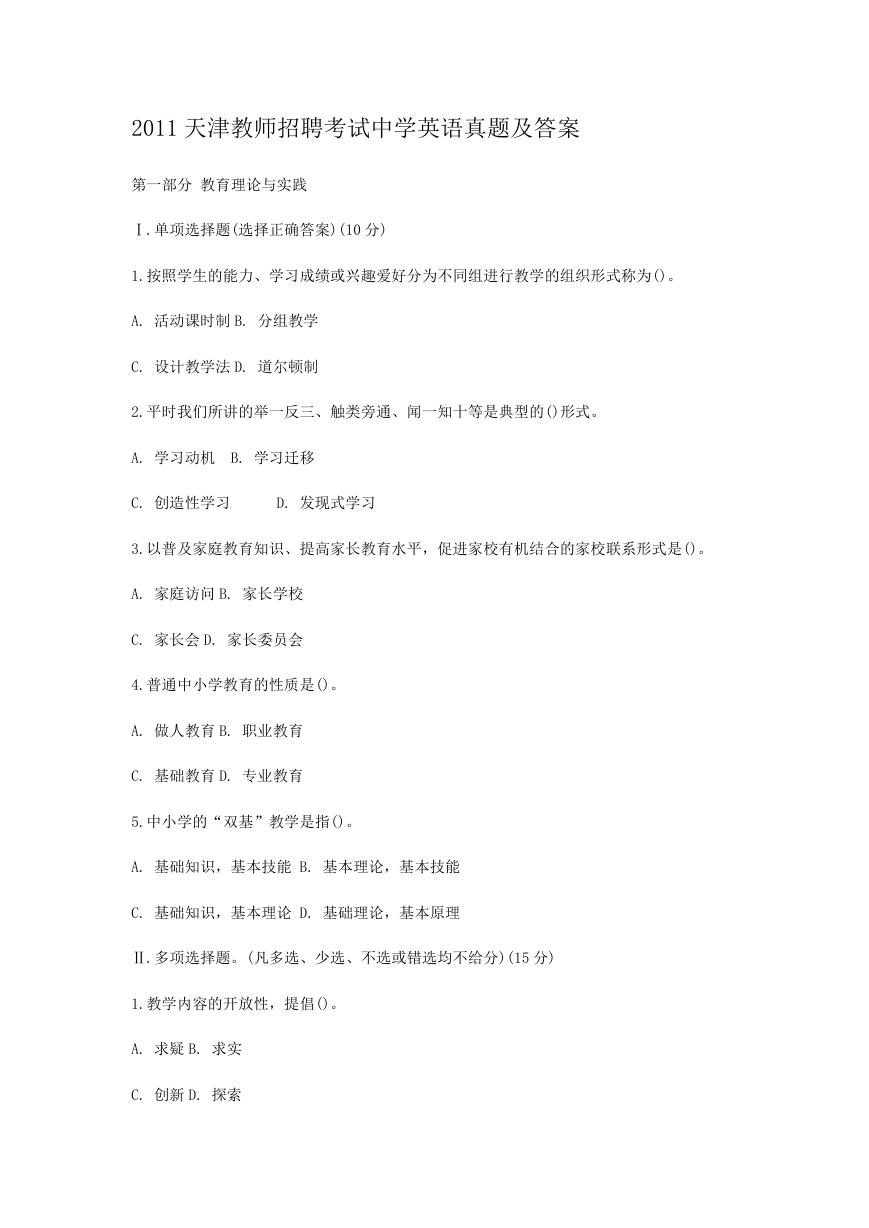
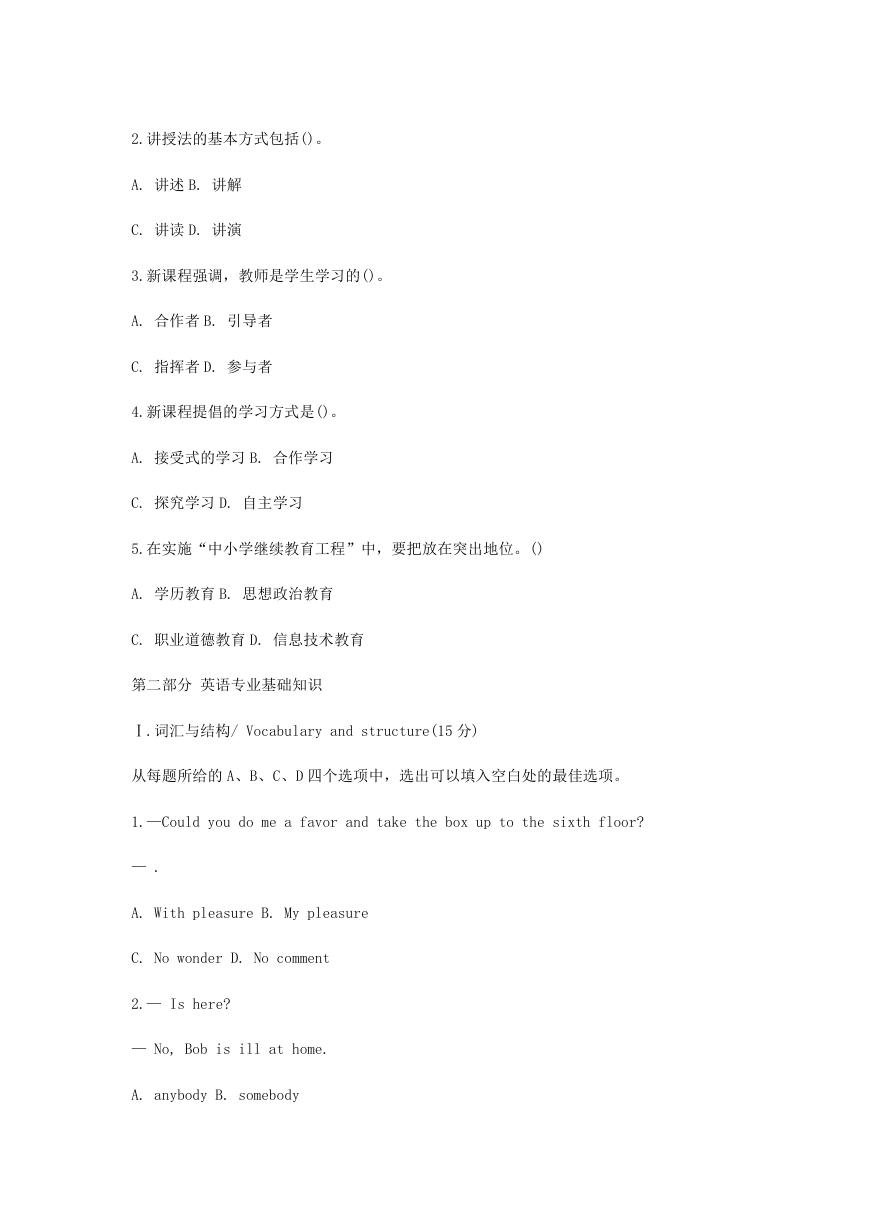
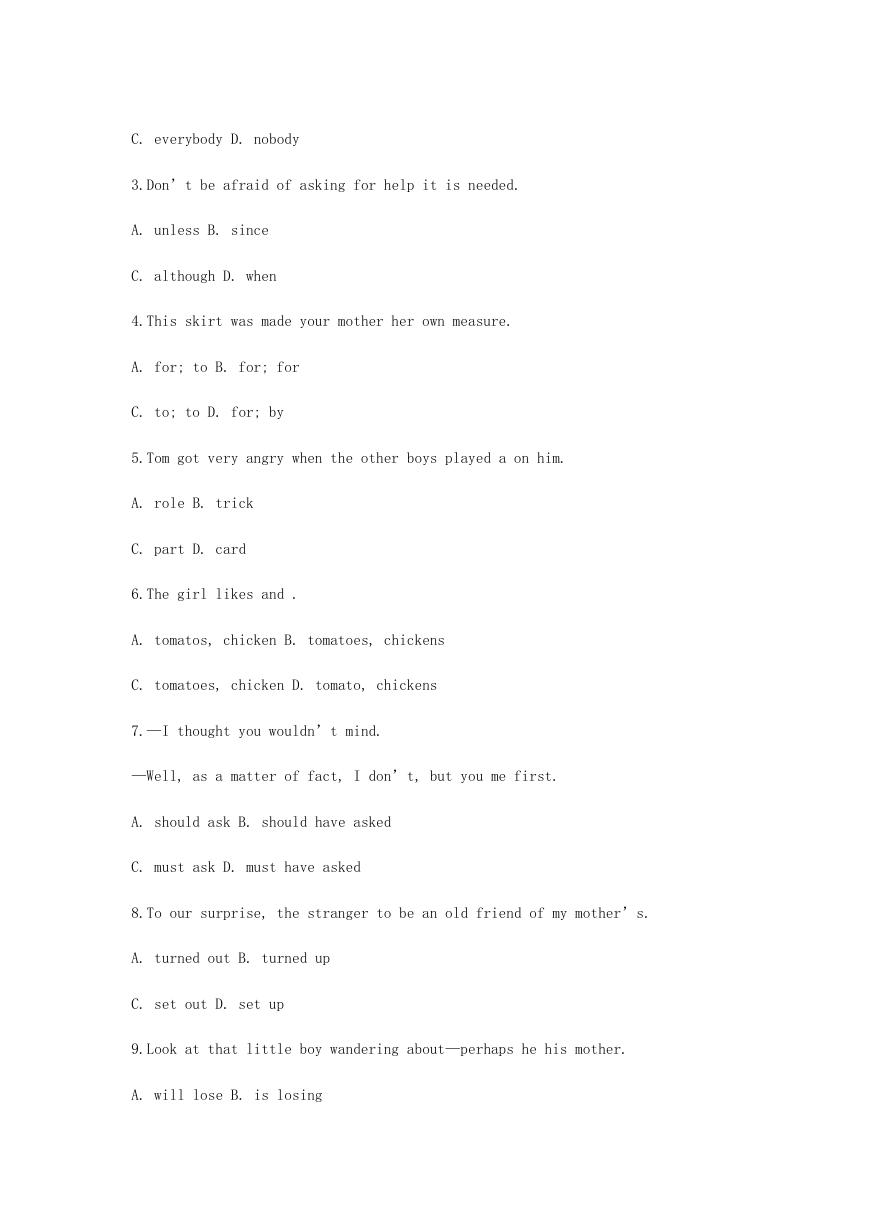
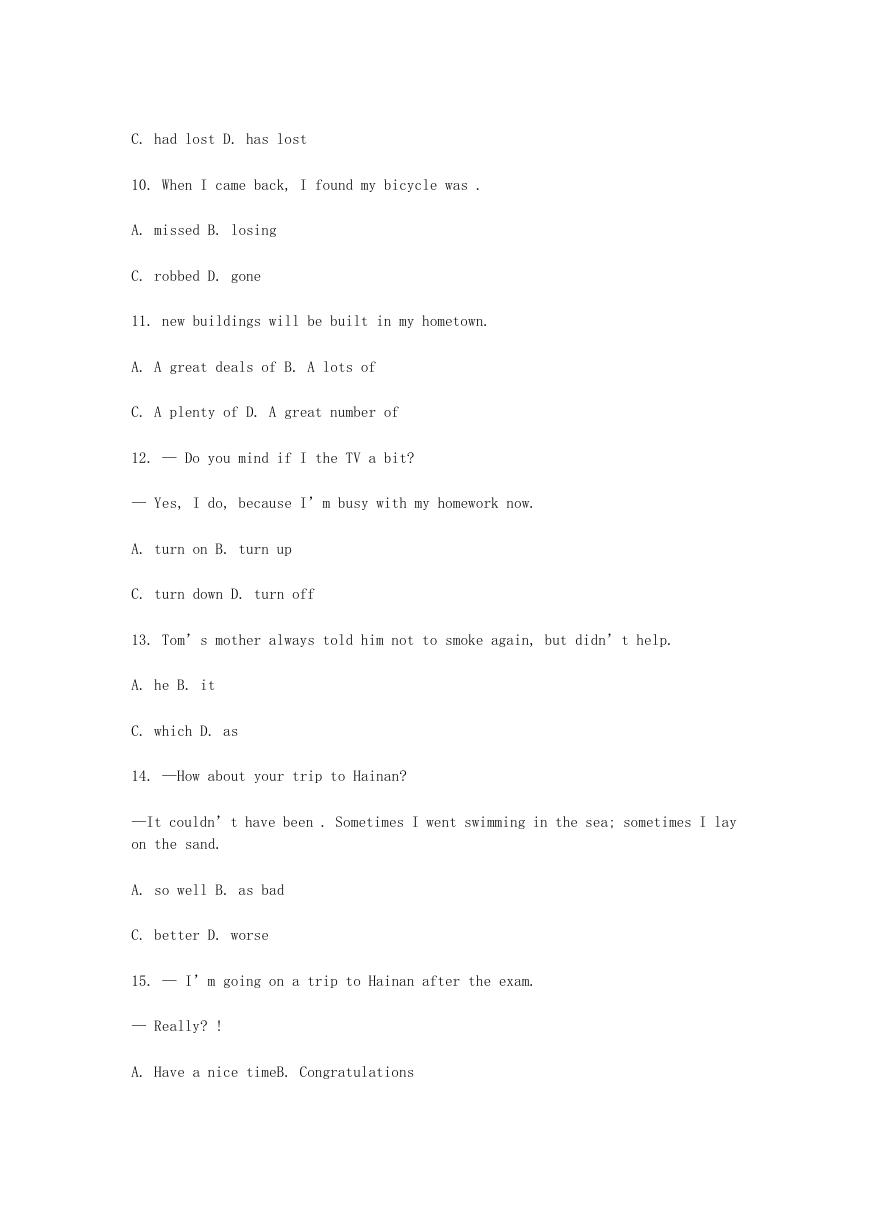
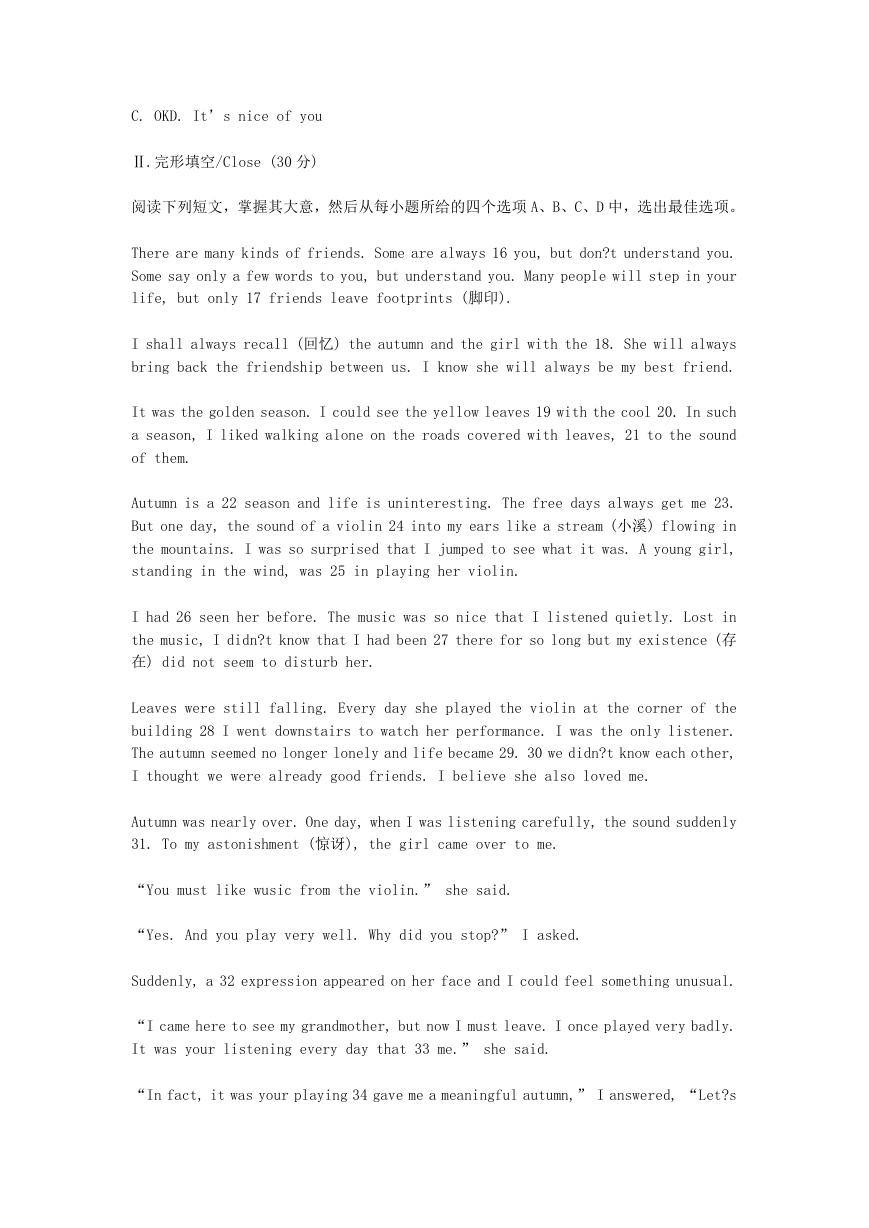

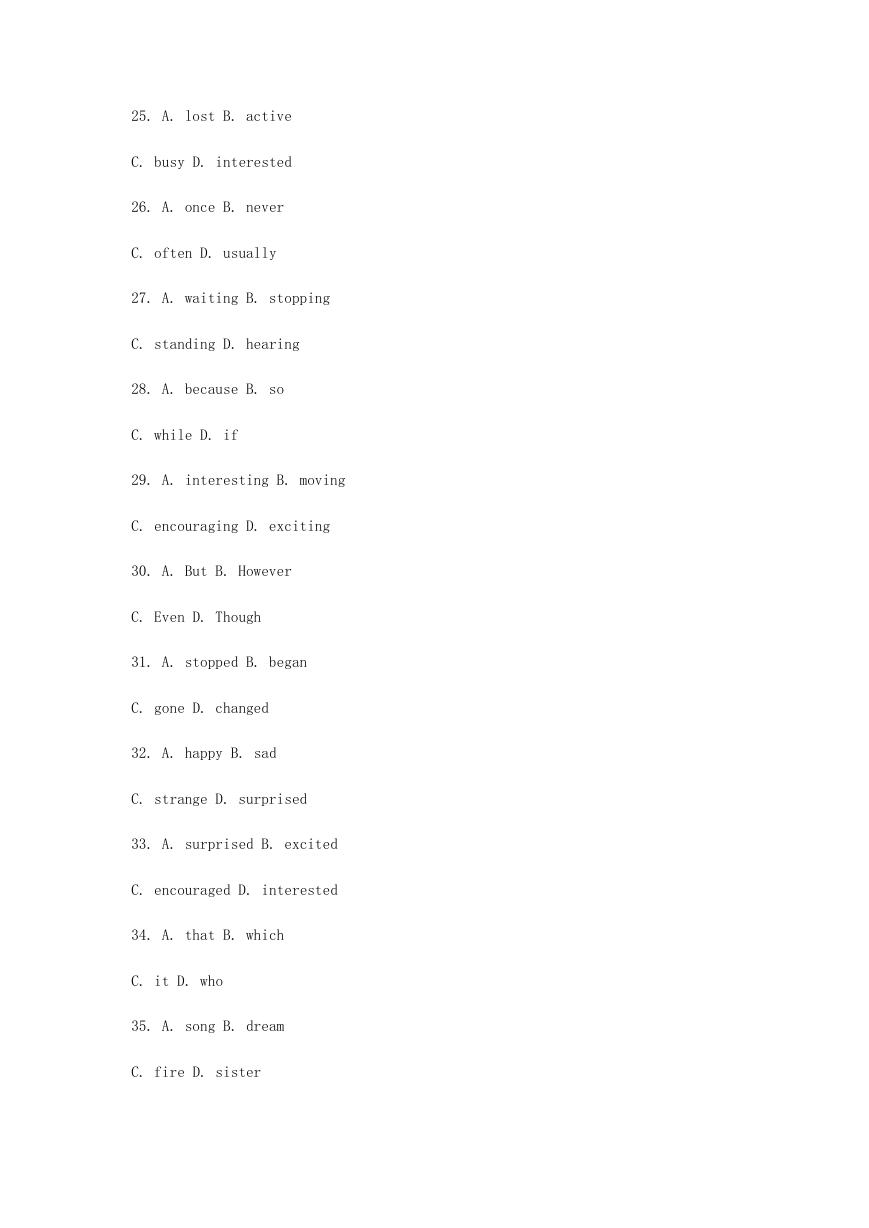
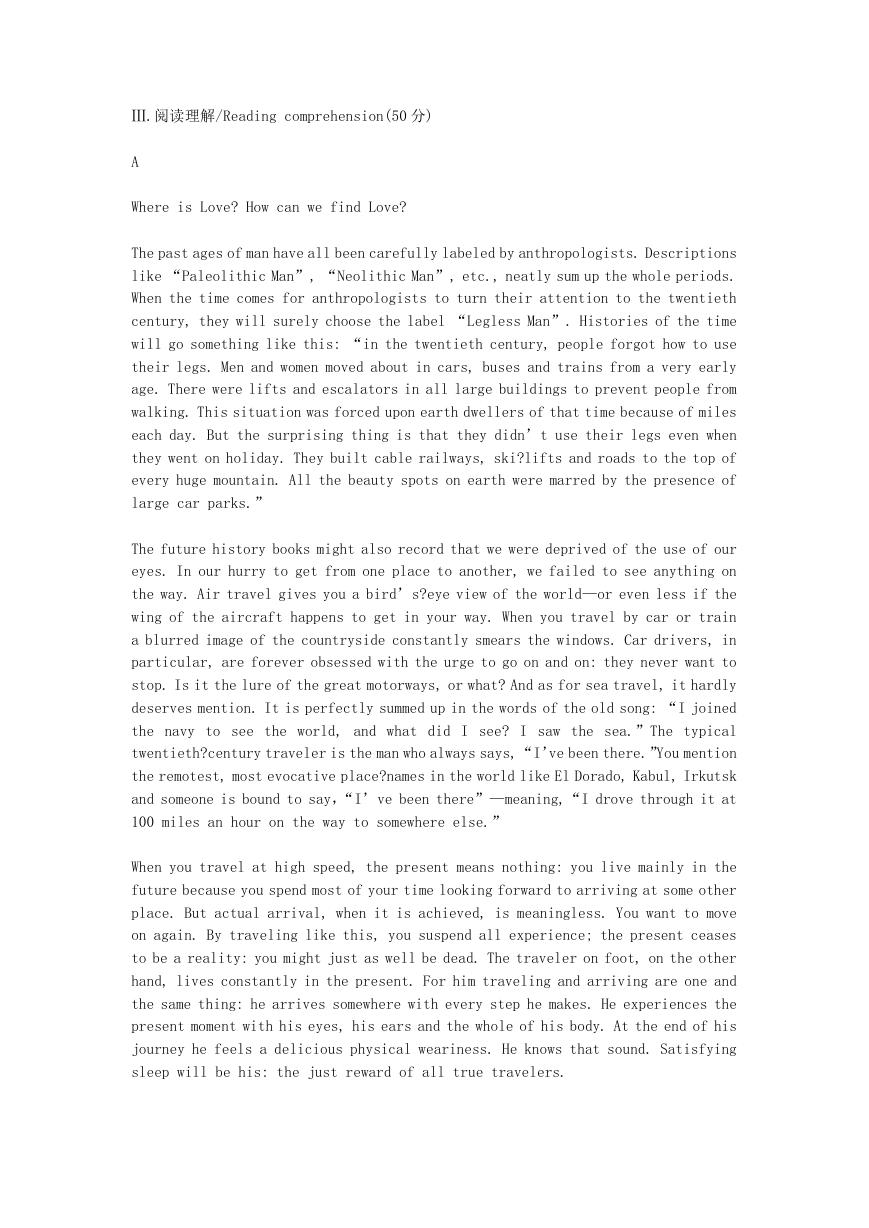








 2023年江西萍乡中考道德与法治真题及答案.doc
2023年江西萍乡中考道德与法治真题及答案.doc 2012年重庆南川中考生物真题及答案.doc
2012年重庆南川中考生物真题及答案.doc 2013年江西师范大学地理学综合及文艺理论基础考研真题.doc
2013年江西师范大学地理学综合及文艺理论基础考研真题.doc 2020年四川甘孜小升初语文真题及答案I卷.doc
2020年四川甘孜小升初语文真题及答案I卷.doc 2020年注册岩土工程师专业基础考试真题及答案.doc
2020年注册岩土工程师专业基础考试真题及答案.doc 2023-2024学年福建省厦门市九年级上学期数学月考试题及答案.doc
2023-2024学年福建省厦门市九年级上学期数学月考试题及答案.doc 2021-2022学年辽宁省沈阳市大东区九年级上学期语文期末试题及答案.doc
2021-2022学年辽宁省沈阳市大东区九年级上学期语文期末试题及答案.doc 2022-2023学年北京东城区初三第一学期物理期末试卷及答案.doc
2022-2023学年北京东城区初三第一学期物理期末试卷及答案.doc 2018上半年江西教师资格初中地理学科知识与教学能力真题及答案.doc
2018上半年江西教师资格初中地理学科知识与教学能力真题及答案.doc 2012年河北国家公务员申论考试真题及答案-省级.doc
2012年河北国家公务员申论考试真题及答案-省级.doc 2020-2021学年江苏省扬州市江都区邵樊片九年级上学期数学第一次质量检测试题及答案.doc
2020-2021学年江苏省扬州市江都区邵樊片九年级上学期数学第一次质量检测试题及答案.doc 2022下半年黑龙江教师资格证中学综合素质真题及答案.doc
2022下半年黑龙江教师资格证中学综合素质真题及答案.doc